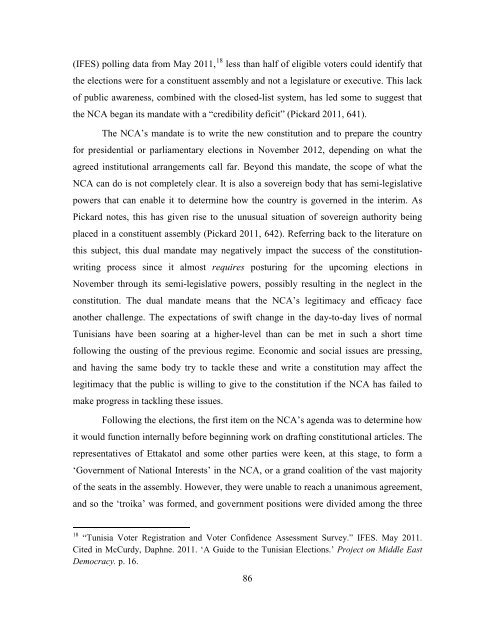Tunisia: Understanding Conflict 2012 - Johns Hopkins School of ...
Tunisia: Understanding Conflict 2012 - Johns Hopkins School of ...
Tunisia: Understanding Conflict 2012 - Johns Hopkins School of ...
Create successful ePaper yourself
Turn your PDF publications into a flip-book with our unique Google optimized e-Paper software.
(IFES) polling data from May 2011, 18 less than half <strong>of</strong> eligible voters could identify that<br />
the elections were for a constituent assembly and not a legislature or executive. This lack<br />
<strong>of</strong> public awareness, combined with the closed-list system, has led some to suggest that<br />
the NCA began its mandate with a “credibility deficit” (Pickard 2011, 641).<br />
The NCA’s mandate is to write the new constitution and to prepare the country<br />
for presidential or parliamentary elections in November <strong>2012</strong>, depending on what the<br />
agreed institutional arrangements call far. Beyond this mandate, the scope <strong>of</strong> what the<br />
NCA can do is not completely clear. It is also a sovereign body that has semi-legislative<br />
powers that can enable it to determine how the country is governed in the interim. As<br />
Pickard notes, this has given rise to the unusual situation <strong>of</strong> sovereign authority being<br />
placed in a constituent assembly (Pickard 2011, 642). Referring back to the literature on<br />
this subject, this dual mandate may negatively impact the success <strong>of</strong> the constitutionwriting<br />
process since it almost requires posturing for the upcoming elections in<br />
November through its semi-legislative powers, possibly resulting in the neglect in the<br />
constitution. The dual mandate means that the NCA’s legitimacy and efficacy face<br />
another challenge. The expectations <strong>of</strong> swift change in the day-to-day lives <strong>of</strong> normal<br />
<strong>Tunisia</strong>ns have been soaring at a higher-level than can be met in such a short time<br />
following the ousting <strong>of</strong> the previous regime. Economic and social issues are pressing,<br />
and having the same body try to tackle these and write a constitution may affect the<br />
legitimacy that the public is willing to give to the constitution if the NCA has failed to<br />
make progress in tackling these issues.<br />
Following the elections, the first item on the NCA’s agenda was to determine how<br />
it would function internally before beginning work on drafting constitutional articles. The<br />
representatives <strong>of</strong> Ettakatol and some other parties were keen, at this stage, to form a<br />
‘Government <strong>of</strong> National Interests’ in the NCA, or a grand coalition <strong>of</strong> the vast majority<br />
<strong>of</strong> the seats in the assembly. However, they were unable to reach a unanimous agreement,<br />
and so the ‘troika’ was formed, and government positions were divided among the three<br />
18 “<strong>Tunisia</strong> Voter Registration and Voter Confidence Assessment Survey.” IFES. May 2011.<br />
Cited in McCurdy, Daphne. 2011. ‘A Guide to the <strong>Tunisia</strong>n Elections.’ Project on Middle East<br />
Democracy. p. 16.<br />
86
















